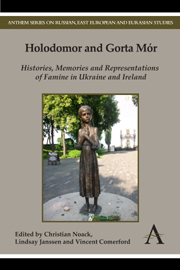Book contents
- Frontmatter
- Contents
- List of Figures
- Acknowledgements
- Introduction Holodomor and Gorta Mór: Histories, Memories and Representations of Famine in Ukraine and Ireland
- Part I Histories, Historiography and Politics
- Part II Public Commemoration
- Chapter 4 History and National Identity Construction: The Great Famine in Irish and Ukrainian History Textbooks
- Chapter 5 Teaching Hunger: The Great Irish Famine Curriculum in New York State Schools
- Chapter 6 Remembering Famine Orphans: The Transmission of Famine Memory between Ireland and Quebec
- Chapter 7 The Irish Famine and Commemorative Culture
- Part III Trauma and Victimisation
- Part IV New Sources and New Approaches to the Irish and Ukrainian Famines
- Index
Chapter 6 - Remembering Famine Orphans: The Transmission of Famine Memory between Ireland and Quebec
from Part II - Public Commemoration
Published online by Cambridge University Press: 05 May 2013
- Frontmatter
- Contents
- List of Figures
- Acknowledgements
- Introduction Holodomor and Gorta Mór: Histories, Memories and Representations of Famine in Ukraine and Ireland
- Part I Histories, Historiography and Politics
- Part II Public Commemoration
- Chapter 4 History and National Identity Construction: The Great Famine in Irish and Ukrainian History Textbooks
- Chapter 5 Teaching Hunger: The Great Irish Famine Curriculum in New York State Schools
- Chapter 6 Remembering Famine Orphans: The Transmission of Famine Memory between Ireland and Quebec
- Chapter 7 The Irish Famine and Commemorative Culture
- Part III Trauma and Victimisation
- Part IV New Sources and New Approaches to the Irish and Ukrainian Famines
- Index
Summary
The adoption of Irish Famine orphans by French-Canadian families has long been remembered in Quebec as a traumatic historical experience that nevertheless brought the French and Irish closer together. It is commonplace to note that many of these famine orphans kept their Irish surnames but became fully integrated into French-Canadian society. In the ‘Orphans’ Heritage Minute – a genre of sixty-second capsule history broadcast frequently by the Canadian Broadcasting Corporation in the 1990s – French-Canadian ‘sympathy for the victims’ and endeavours to ‘preserve the Irish identity of the children’ are specifically emphasised. This chapter examines the documentary sources on which the popular memory of the famine orphans is based. In particular, it suggests that their memory can be traced not to contemporary records and correspondences between the French-Canadian and Irish clerics, religious and lay benefactors and government officials who first ministered to the famine migrants on Grosse Isle and in Montreal in 1847, but rather to a set of pastoral letters, pamphlets, didactic novels and travelogues published a generation after the Famine in the 1860s, especially John Francis Maguire's The Irish in America (1868).
- Type
- Chapter
- Information
- Holodomor and Gorta MórHistories, Memories and Representations of Famine in Ukraine and Ireland, pp. 115 - 144Publisher: Anthem PressPrint publication year: 2012
- 3
- Cited by

